

Helen Anderson
Higher education, technology, and virtual world enthusiast.
5000 Free Stock Photos. Easily Publish Gorgeous Magazines. OER Commons. Innovative Learning. Instructional Technology. Innovative Learning. Taxonomies of Learning Technologies. Grouping learning technologies into categories is a useful way to make sense out of the many tools available.
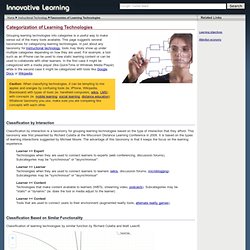
This page suggests several taxonomies for categorizing learning technologies. In just about any taxonomy for instructional technology, tools may likely show up under multiple categories depending on how they are used. For example, a tool such as an iPhone can be used to view static learning content or can be used to collaborate with other learners. In the first case it might be categorized with a media player (like QuickTime or Windows Media Player) while in the second case it might be categorized with tools like Google Docs or Wikipedia.
Classification by Interaction Classification by interaction is a taxonomy for grouping learning technologies based on the type of interaction that they afford. Learner >< Expert Technologies when they are used to connect learners to experts (web conferencing, discussion forums). Classification Based on Similar Functionality Kemmis' 4 Paradigms. Are the Basics of Instructional Design Changing? ~ Stephen's Web ~ by Stephen Downes. Joseph Beckmann wrote: Philosophy is a much larger, much deeper and much more complex activity than "constructivism" could ever encompass.
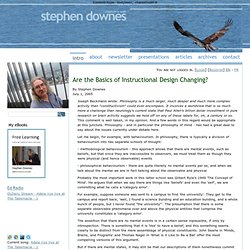
It involves a worldview that is so much more a challenge than neurology's current state that Paul Allen's billion dollar investment in pure research on brain activity suggests we hold off on any of these labels for, oh, a century or so. This comment is well taken, in my opinion. And a few words in this regard would be appropriate at this juncture. Philosophy - and in particular the philosophy of mind - has had a great deal to say about the issues currently under debate here. Let me begin, for example, with behaviourism. . - methodological behaviourism - this approach allows that there are mental events, such as beliefs, but that since they are inaccessible to observers, we must treat them as though they were physical (and hence observable) events Probably the most important work in this latter school was Gilbert Ryle's 1949 'The Concept of Mind'.
Courses from Top Universities. Advertisment Take online courses from the world’s top universities for free.
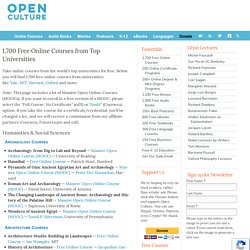
Below, you will find 1,700 free online courses from universities like Yale, MIT, Harvard, Oxford and more. Our site also features collections of Online Certificate Programs and Online Degree & Mini-Degree Programs. Note: This page includes a lot of Massive Open Online Courses (MOOCs). If you want to enroll in a free version of a MOOC, please select the “Full Course, No Certificate” (edX) or “Audit” (Coursera) option. Humanities & Social Sciences. Universities. See our list of the top schools offering free courses online.
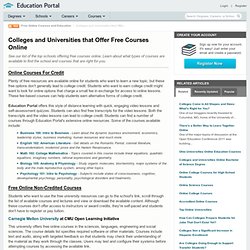
Learn about what types of courses are available to find the school and courses that are right for you. Online Courses for Credit Plenty of free resources are available online for students who want to learn a new topic, but these free options don't generally lead to college credit. Students who want to earn college credit might want to look for online options that charge a small fee in exchange for access to online lessons. These fee-based courses can help students earn alternative forms of college credit. Education Portal offers this style of distance learning with quick, engaging video lessons and self-assessment quizzes.
Free Online Non-Credited Courses Students who want to use the free university resources can go to the school's link, scroll through the list of available courses and lectures and view or download the available content.
Video Solutions for Education Technology. Cool 2.0 & etc... Cube Creator. Summarizing information is an important postreading and prewriting activity that helps students synthesize what they have learned.
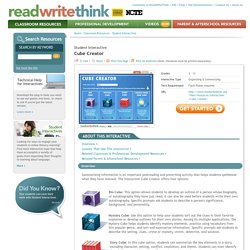
The interactive Cube Creator offers four options: Bio Cube: This option allows students to develop an outline of a person whose biography or autobiography they have just read; it can also be used before students write their own autobiography. Specific prompts ask students to describe a person's significance, background, and personality. Mystery Cube: Use this option to help your students sort out the clues in their favorite mysteries or develop outlines for their own stories. Among its multiple applications, the Mystery Cube helps students identify mystery elements, practice using vocabulary from this popular genre, and sort and summarize information. Story Cube: In this cube option, students can summarize the key elements in a story, including character, setting, conflict, resolution, and theme.
Create-Your-Own Cube: Working on a science unit? Back to top. iTunes U. Free Online Course Materials. Khan Academy. Embry-Riddle Aeronautical University - World's Leader in Aviation and Aerospace Education. Worldwide Campus, Worldwide , Embry-Riddle Aeronautical University. What is Second Life? Exploring and Discovery Travel with friends to thousands of beautiful and exciting places — all created by the Second Life community.
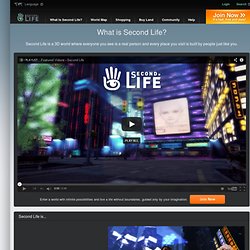
Join Now Filled with Friends Millions of people have already joined Second Life. Chat for free using voice or text with folks from around the world who share your passions and interests. Self-Expression Dress up and design a new 3D you. Endless Fun Every day there are thousands of new experiences and events created by the Second Life community. Artistic Bliss Discover your artistic t a lents and share them instantly with friends.